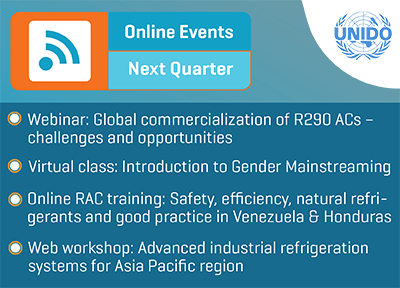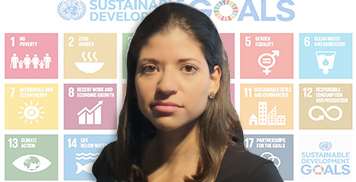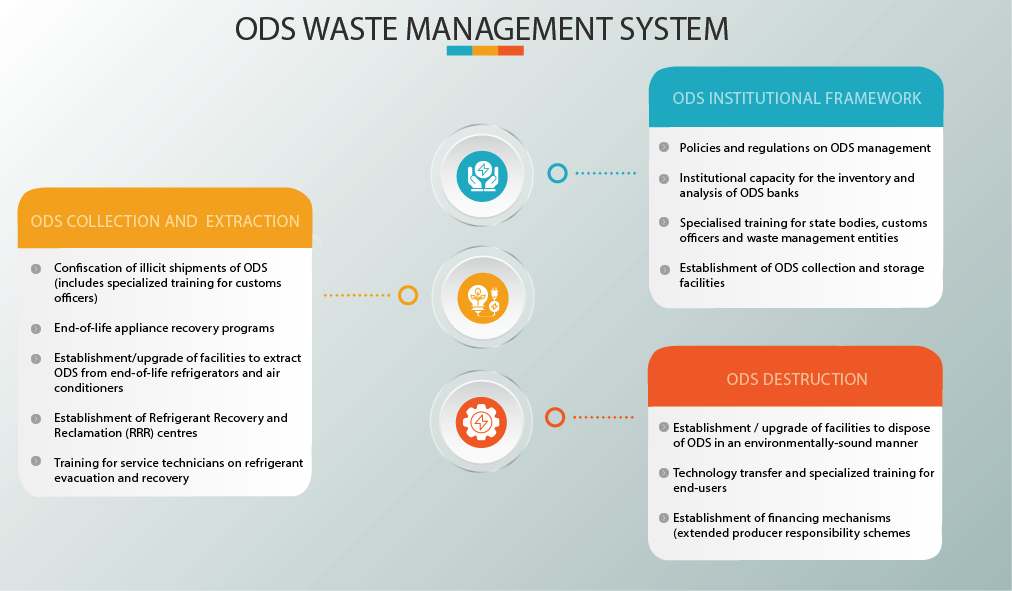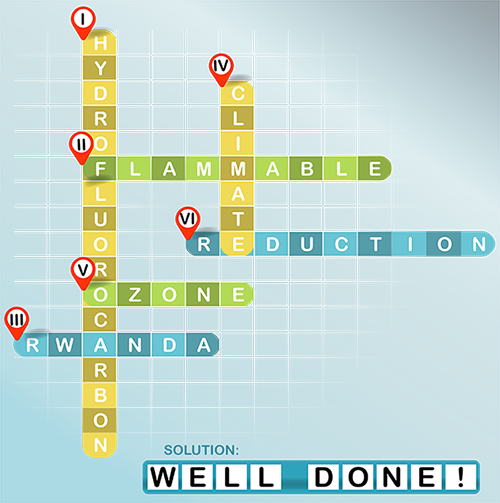Share this:
Welcome to the UNIDO Montreal Protocol Newsletter
The latest edition of the Montreal Protocol Division’s newsletter touches upon a common theme: alternatives. As another World Ozone Day passes, it is evident that the conversation is no longer only about the success of the international community in helping the ozone layer heal, but rather that of climate change. As the latest report of the Intergovernmental Panel on Climate Change confirmed in August 2021, it is unequivocal that human influence has warmed the atmosphere, and we are seeing the effects of climate change before our eyes.
For this reason, it is of vital importance to search for alternatives to our previous way of life; alternatives which do not harm our planet and contribute to climate change. Our feature story touches upon the importance of the recently approved HFC cost guidelines which mark a new chapter in UNIDO’s work, focusing on one successful example of a HFC investment project, namely that of Petra Engineering Industries in Jordan which successfully converted to a natural refrigerant – R290 (Propane). Staying with Jordan, our feature interview for this issue is with Eng. Ghazi Al-Odat and Ms. Sulafa Mdanat, where they discuss suitable alternative technologies in the cooling sector and the additional hurdles faced by high ambient temperature (HAT) countries in finding right alternatives. Moving towards global solutions, our spotlight story features the launch of the “Design of Energy Efficient Environmentally Friendly Refrigerators” course, which provides manufactures and end-users with concrete tools to determine the net benefit for different energy efficient design options for refrigeration equipment. For our “Ask UNIDO” segment, UNIDO Project Coordinator, Ana Acuña Dengo, outlines the problems with ozone depleting substances (ODS) banks and how UNIDO can support countries in finding alternative means to safely disposing of ODS waste.
Happy reading!
Your UNIDO Montreal Protocol Division
ASK UNIDO
Project Coordinator in UNIDO’s Montreal Protocol Division, answers the question “Why do we need to manage banks of ozone depleting substances (ODS) and how does UNIDO support countries in doing so?”
INTERVIEW
from Jordan, discuss suitable alternative technologies in the cooling sector and the additional hurdles faced by high ambient temperature (HAT) countries such as Jordan.
FEATURE ARTICLE
QUIZ - Stay cool and test your knowledge on how refrigeration keeps our food and vaccines cool.

NOTICE BOARD
Notes
-
Social Media
UNIDO’s Montreal Protocol Division commemorates International Women’s Day and calls for action on gender equality.
Notes
-
Events

UNIDO’s Montreal Protocol Division invites you to take part in our upcoming virtual events.
Notes
-
Spotlight
The NOU of Burkina Faso releases a fun and informational video on “How to ensure high-quality refrigerant (French)".
YOU ASK, WE ANSWER!

You Ask, We Answer!
Ana Acuña Dengo, Project Coordinator in UNIDO’s Montreal Protocol Division, answers the question “Why do we need to manage banks of ozone depleting substances (ODS) and how does UNIDO support countries in doing so?”
(5 minutes reading time)
What are ODS banks and why are they a problem?
Ozone Depleting Substances (ODS) were commonly used in major manufacturing sectors throughout the 20th century, before the international community discovered that they were the primary cause of ozone layer depletion. Ozone layer depletion results in an increase in ultraviolet B (UVB) radiation, and is therefore linked to major environmental concerns, as well as long-term negative impacts on human health, such as skin cancer. In addition to this, ODS are potent greenhouse gases, so their emissions also contribute directly to climate change.
In light of this, the Montreal Protocol on Substances that Deplete the Ozone Layer – better known as the Montreal Protocol – was adopted, as a means to regulate the production and consumption of ODS across the globe. Over the course of three decades, actions taken under the Montreal Protocol successfully diminished the production, use and observed atmospheric concentrations of ODS, with scientific evidence pointing to the gradual recovery of the Earth’s ozone layer.
However, when the Montreal Protocol was originally conceived, it did not include provisions to regulate so-called “ODS banks”. These are the stockpiles of ODS contained within end-of-life of refrigeration and air-conditioning equipment, chemicals, aerosols, foams, and other products, that are not subject to post-market control measures under the Montreal Protocol. Without the necessary infrastructure and waste management regulations in place, large volumes of ODS-containing equipment or products have ended up in landfills around the world, where there is a serious risk of ODS leaking out into the atmosphere.
Managing ODS banks is essential to avoid the release of greenhouse gases into the atmosphere and keep global warming under the threshold of two degrees Celsius set by the Paris Agreement.
What are the challenges countries face in managing their ODS banks and how does UNIDO provide support?
Managing ODS banks is a major challenge for developing countries and countries with economies in transition, as they may not have the infrastructure, technologies or technical capacity necessary to safely collect, transport and destroy these substances.
Many countries with large ODS banks opt to send these gases to other countries where they can be properly destroyed, but this poses another series of problems: (1) ODS are classified as hazardous waste. Transboundary movements of hazardous waste must follow international policies, including the requirements of the Basel Convention. This means that exporters, customs officers, and service providers all have to follow special procedures if they are engaged in the collection, storage and transportation of ODS. (2) The handling and exportation costs – which can be extremely high – must be accounted for in the cost of disposal. This means that there is then an economic disincentive to process this waste in an environmentally sound manner.
In light of this, countries with large ODS banks are now seeking solutions which would allow them to manage their ODS banks, as well as other waste streams, at the national level. This is where UNIDO comes in.
UNIDO supports developing countries and countries with economies in transition in building the necessary infrastructure to collect, transport, store and dispose of ODS gases in an environmentally-friendly manner.
For countries to effectively manage their ODS banks, they need a comprehensive waste management system. This requires strong policy, regulatory and institutional frameworks for the control, collection, recovery and treatment of ODS, involving not only legislation, but also the institutional capacity of qualified state bodies, the analytical capability of laboratories, as well as data tools to monitor stocks and waste streams. Finally, this system requires the adequate infrastructure and technology to extract, recover and dispose of ODS in an environmentally sound manner.

The first UNIDO demonstration project for ODS disposal was completed in Mexico in 2017. This project proved the feasibility of ODS destruction using two different technologies: Argon plasma arc and cement kiln co-processing (see below).
In plasma combustion, a plasma torch is powered by an electric arc, which is created by a strong electric current passing between two electrodes. The torch’s temperature can reach up to 2,500°C, which can effectively breakdown ODS and other hazardous waste streams and reduce it to inert slag. The added benefit of this is that the slag can be used in the construction industry or for road paving, thereby reducing the need for raw materials. In the case of cement kiln co-processing, the ODS is fed into the kiln´s main burner, while fuels are fed in parallel, ensuring the destruction of hazardous components through high temperatures and long residence time.
By means of these two technologies, the project led to the destruction of 113 tons of ODS, which can be equated to CO2 emissions produced by 108,000 fossil-fuel powered vehicles in the course of one year.
Following the success of the Mexico demonstration project, we are taking this approach one step further, by working with countries in the Eastern Europe and Central Asia region to find joint solutions for the disposal of ODS alongside other hazardous chemicals. Under the UNIDO Regional Demonstration Project for Coordinated Management of ODS and POPs Disposal in Ukraine, Belarus, Kazakhstan and Armenia, financed by the Global Environment Facility (GEF), we are supporting countries in developing the policy framework and industrial capacity to pilot technologies for the destruction of ODS and persistent organic pollutants (POPs).
This project will help the target countries build the necessary waste management framework to manage ODS banks, but also create opportunities for them to reduce landfill waste, recover valuable materials from end-of-life of equipment, decrease toxic exposure from other chemicals and prevent greenhouse gas emissions.
Such pilot initiatives are a promising example of how we can combine resources to solve global environmental challenges. Traditionally, ODS reductions were funded by the Multilateral Fund for the Implementation of the Montreal Protocol, but now that it is widely recognized that ODS banks damage both the ozone layer and the climate system, their disposal can be financed through climate-dedicated funding or within the framework of larger sustainable development projects.
At UNIDO, together with our traditional and non-traditional donors, we stand ready to continue to support countries around the world in taking actions to reduce the concentration of ODS in the atmosphere and protect our planet from major environmental threats.
INTERVIEW

Interview with Ms. Sulafa Mdanat and Eng. Ghazi Al-Odat
Eng. Ghazi Al-Odat and Ms. Sulafa Mdanat from Jordan, discuss suitable alternative technologies in the cooling sector and the additional hurdles faced by high ambient temperature (HAT) countries such as Jordan.
(5 minutes reading time)
When did Jordan start to phase down Hydrofluorocarbons (HFCs) and what path is the country following? (Eng. Sulafa Mdanat)
The Government of Jordan ratified the Kigali Amendment to the Montreal Protocol on 18th October 2019 and it subsequently entered into force on 14th January 2020. Jordan then rolled out a licensing system in March 2021 to control the import, export and consumption of HFCs.
Following the successful implementation of the project Enabling activities for HFC phase-down that helped Jordan ratify the Kigali Amendment, UNIDO and the Government of Jordan are now beginning a new chapter. With the adoption of the cost-guidelines for the preparation of HFC phase-down plans, the Executive Committee of the Montreal Protocol approved funding for Jordan to start with the preparation of the so-called Kigali HFC implementation plan (KIP). With UNIDO as implementing agency, this project will pave the way for Jordan to prepare a robust strategy to phase-down HFCs.
What is Jordans experience identifying alternative solutions for High Ambient Temperature (HAT) countries such as Jordan? (Eng. Ghazi Al-Odat)
Jordan is a High Ambient Temperature (HAT), which means that it faces additional hurdles in selecting suitable zero ozone depleting potential (ODP) and low global warming potential (GWP) refrigerants for retail refrigeration installations, as the technology required needs to operate at higher temperatures. To promote HFC alternative technologies, UNIDO together with the Climate and Clean Air Coalition (CCAC) conducted a demonstration project in a Jordanian supermarket.
The government of Jordan agreed to work within the first group[1] under the Kigali Amendment to expedite the phase down of HFCs according to the amendment’s schedule. To date, there is no mechanism for facilitating and supporting the retail sector in replacing high GWP commercial refrigerators with alternative CO2 technologies or retrofitting the existing commercial refrigerators. Therefore, HCFC phase-out and HFC phase-down is usually driven by costs and to a lesser extent by energy efficiency.
UNIDO, in collaboration with CCAC, conducted a demonstration project in the supermarket Aswaq Alsalam located in Jordan’s capital Amman. The full-scale replacement of an existing HCFC-22 installation with a CO2 system, demonstrates the feasibility of adopting non-HFC alternatives. Results show that the system is delivering on energy savings, zero food loss and no maintenance costs in the first years of operation. The system’s success has established a better understanding of the applicability of this technology in countries with high ambient temperatures. This has not only stimulated innovation in the national industry, but also encouraged follow up projects in the region. These positive results[2] are a needed stimulus for the retail sector and there is now a greater willingness among larger supermarkets in Jordan to use CO2 technologies.
Eng. Ghazi, when discussing the Montreal Protocol in Jordan, there is no way of not mentioning your name based on your involvement from the start, through all its challenges, changes and of course accomplishments. In your opinion, why is the celebration of the Ozone Day so important? (Eng. Ghazi Al-Odat)
International Ozone Day, was initiated by the United Nations General Assembly and has been celebrated since 1994, commemorating the date of the signing of the Montreal Protocol in 1987 on 16 September. World Ozone Day is important because it is a day used for spreading awareness on ozone layer depletion, as well as, the search for solutions in preserving it. The ozone layer is a part of the atmosphere that has high ozone concentrations. Educators seize this occasion to teach their students about the ozone layer. Schools organize events to raise awareness on this topic which is an opportunity for everyone to share and exchange experiences.
Ozone Day simultaneously increases awareness of the Montreal Protocol among ministries, stakeholders, private and public sectors. Governments around the world collaborate with international partners in order to protect the ozone layer and fight against climate change. This collaboration has led to an increasingly high awareness of Montreal Protocol initiatives in the industrial sector. Sensitization of the importance of keeping pace with environmentally friendly technologies to maintain competitiveness is also emphasized. The phase-out of controlled substances and the related reductions have not only helped protect the ozone layer for this and future generations, but have contributed significantly to global efforts to address climate change. Furthermore, it has protected human health and the ecosystem by limiting the harmful ultraviolet radiation from reaching the earth. This year, we celebrated 36 years of the signing of the Vienna convention and herewith the initiation of global efforts to protect the ozone layer. The HCFCs phase out schedule started in 1996 for developed countries and in 2009 for developing countries. During the 28th Meeting of the Parties to the Montreal Protocol (MOP) held 10th-15th October 2016, in Kigali/Rwanda it was agreed to gradually reduce the consumption and production of HFCs.
World Ozone Day highlights the Montreal Protocol’s extensive work related to slowing climate change and helping to boost energy efficiency in the cooling sector, which has a co-benefit of contributing to food security, because one third of all food produced globally for human consumption is wasted each year largely due to the lack of access to cold chains and storage.
Food loss and waste amounts to billions of US$ annually. Therefore, countries should develop cold chain solutions that are more efficient, climate friendly, and less costly.
For these reasons, on this international acknowledged day, we celebrate the Montreal Protocol and its Kigali Amendment in the wider efforts to keep humans and the environment protected our food and medication (especially vaccines) cool.
Which challenges will Jordan be facing in the next years, implementing the Montreal Protocol? (Eng. Sulafa Mdanat)
With financial and technical support from the MLF and UNIDO respectively, Jordan will be well capacitated in implementing and Montreal Protocol and the Kigali Amendment over the next 20 years, and most importantly complying with its obligations under the Protocol.
Despite tremendous efforts, however, it is envisaged that small and medium enterprises (SMEs) in the refrigeration and air conditioning sectors would require special attention in transitioning to the use of alternatives to HCFCs and HFCs. Substantial technical training combined with necessary tools and equipment is required to absorb the new technologies. Import, storage, transportation, distribution, handling and using of alternatives of HFCs need specifications, standards, trainings and the application of safety measures are frontiers, which the Ministry of Environment of Jordan will embark upon.
[1] First group countries under the Kigali Amendment are committed to reduce the use of HFCs by 45% by 2024 and by 85% by 2036, compared to their use between 2011 and 2013. A second group, which includes China and Brazil, is committed to reducing its consumption by 80% by 2045. Jordan as HAT country is eligible to enter into group 2 but decided to commit to a shorter HFC phase-down.
[2] Read more about the projects results on UNIDOs open data platform: https://open.unido.org/api/documents/17650119/download/Final%20project%20report_%20Jordan_CO2%20Supermarket.pdf
FEATURE ARTICLE

UNIDO gets green light to help countries intensify fight against global warming
To commemorate World Ozone Day 2021, UNIDO published a story on the most recent milestone for the Montreal Protocol: the approval of funding guidelines for the preparation of HFC phase down plans, showcasing one of UNIDO’s first HFC conversion projects in Jordan.
(3 minutes reading time)
UNIDO gets green light to help countries intensify fight against global warming
Why do we need to care about atmospheric ozone? Because the ozone layer is the Earth’s sunscreen. It protects us from harmful ultraviolet radiation that puts destructive pressures on the agricultural and natural ecosystems and poses a high risk for public health. The emissions of ozone-depleting substances (ODS) happen to be almost exclusively a result of industrial activity.
In 1987, the United Nations (UN) and its Member States initiated the Montreal Protocol on Substances that Deplete the Ozone Layer. It is considered the most successful environmental treaty to date. The ozone hole has begun to close.
“Let us take encouragement from how we have worked together to preserve the ozone layer and apply the same will to healing the planet and forging a brighter and more equitable future for all humanity,” highlighted UN Secretary-General Antonio Guterres.
Recently, due to growing concerns about climate change, a new question has been posed: are hydrofluorocarbons (HFCs) – the current replacements of the ozone-depleting hydrochlorofluorocarbons (HCFCs) and chlorofluorocarbons (CFCs) – a smart and safe choice?
This is why the Kigali Amendment has come into play. The signatories to the Montreal Protocol agreed that they would not only continue to phase out the ODS, but also ensure that these are not replaced with chemicals with high global warming potential (GWP), such as HFCs. This Amendment to the Montreal Protocol has become a significant instrument against global warming: it is expected to help avoid up to 0.4°C of temperature rise by the end of the century, while continuing to protect the ozone layer.
After years of deliberations, in June 2021, the first-ever cost guidelines for preparing HFC phase-down plans were approved by the Executive Committee for the Implementation of the Montreal Protocol. This approval means that Article-5 countries, which have ratified the Kigali Amendment, can now request preparatory funding to develop strategies to phase-down their HFC consumption.
At the same landmark Executive Committee meeting, the United Nations Industrial Development Organization (UNIDO) received US$ 1.62 million to start preparing HFC phase-down plans in 12 countries, namely Albania, Bolivia, Ecuador, Jordan, Mexico, Montenegro, Nicaragua, Niger, Nigeria, North Macedonia, Senegal and South Africa. The development of these plans is now a top priority for the Organization.
Overall, since 1993, UNIDO has received over US$900m to implement projects in 111 countries, including supporting more than 350 enterprises. The portfolio of projects has included enabling activities to assist countries with the ratification of the Kigali Amendment, as well as the implementation of HFC phase-down investment initiatives. Through technology demonstration projects, the Organization helps individual industries apply best available techniques and practices.
One such HFC investment project has been successfully carried out with Petra Engineering Industries in Jordan. Implemented by UNIDO and funded by the Multilateral Fund for the Implementation of the Montreal Protocol (MLF), it focused on: the identification of incremental capital and operating costs while improving the energy efficiency; and reduction of the use of synthetic refrigerants in large commercial rooftop air-conditioning units by replacing them with low GWP refrigerants.
Numerous training sessions were held to educate technicians on how to work safely with air-conditioning equipment that contains flammable refrigerants. Several prototype units were tested to compare energy performance, cooling capacity, refrigerant charge amounts, and costs.
In addition to the demonstrated climate benefits of conversion, the project showed that using a natural refrigerant – R290 (propane) – leads to the same or better energy efficiency even at higher ambient temperatures.
R290 looks to be a long-term, sustainable solution to the challenge of environmentally friendly refrigeration and air-conditioning systems for the modern world.
“The R290 component now costs about 10% higher compared to using R407C (an HFC blend). However, with mass production in the future, we expect to eliminate that premium,” said Samir Hamed, General Manager at Petra Engineering Industries.
In addition, Petra and UNIDO are producing awareness-raising publications covering the latest global refrigeration trends, which are distributed among consultants working in this field.
This year’s World Ozone Day, commemorating the date of the signing of the Montreal Protocol, seeks to remind us that the Protocol is much more than a sunscreen – it’s a much-needed and powerful tool to help us cool our planet.
Written by Dana Zhmudska, UNIDO Advocacy and Media Relations Advisor
See original published article on our UNIDO website: https://www.unido.org/stories/unido-gets-green-light-help-countries-intensify-fight-against-global-warming
CONTACT US
Subscribe to our newsletter
Sign up to receive a quarterly email with updates and new content!
Disclaimer
The information presented in this newsletter does not necessarily reflect the views of UNIDO. Links to external websites are included solely to provide additional information and do not imply any official endorsement of the opinions, ideas, data, or products presented.
Share this:
© 2021 UNIDO Montreal Protocol
